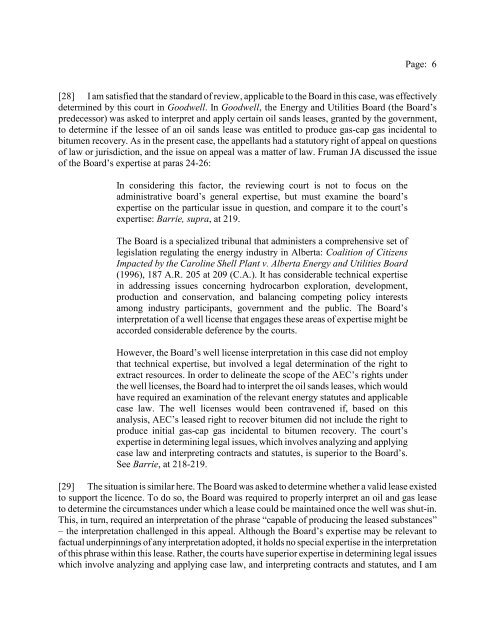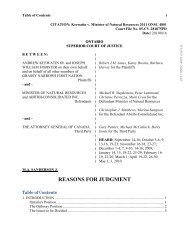Omers Energy Inc. v. Alberta (Energy Resources Conservation Board)
Omers Energy Inc. v. Alberta (Energy Resources Conservation Board)
Omers Energy Inc. v. Alberta (Energy Resources Conservation Board)
- No tags were found...
Create successful ePaper yourself
Turn your PDF publications into a flip-book with our unique Google optimized e-Paper software.
Page: 6[28] I am satisfied that the standard of review, applicable to the <strong>Board</strong> in this case, was effectivelydetermined by this court in Goodwell. In Goodwell, the <strong>Energy</strong> and Utilities <strong>Board</strong> (the <strong>Board</strong>’spredecessor) was asked to interpret and apply certain oil sands leases, granted by the government,to determine if the lessee of an oil sands lease was entitled to produce gas-cap gas incidental tobitumen recovery. As in the present case, the appellants had a statutory right of appeal on questionsof law or jurisdiction, and the issue on appeal was a matter of law. Fruman JA discussed the issueof the <strong>Board</strong>’s expertise at paras 24-26:In considering this factor, the reviewing court is not to focus on theadministrative board’s general expertise, but must examine the board’sexpertise on the particular issue in question, and compare it to the court’sexpertise: Barrie, supra, at 219.The <strong>Board</strong> is a specialized tribunal that administers a comprehensive set oflegislation regulating the energy industry in <strong>Alberta</strong>: Coalition of CitizensImpacted by the Caroline Shell Plant v. <strong>Alberta</strong> <strong>Energy</strong> and Utilities <strong>Board</strong>(1996), 187 A.R. 205 at 209 (C.A.). It has considerable technical expertisein addressing issues concerning hydrocarbon exploration, development,production and conservation, and balancing competing policy interestsamong industry participants, government and the public. The <strong>Board</strong>’sinterpretation of a well license that engages these areas of expertise might beaccorded considerable deference by the courts.However, the <strong>Board</strong>’s well license interpretation in this case did not employthat technical expertise, but involved a legal determination of the right toextract resources. In order to delineate the scope of the AEC’s rights underthe well licenses, the <strong>Board</strong> had to interpret the oil sands leases, which wouldhave required an examination of the relevant energy statutes and applicablecase law. The well licenses would been contravened if, based on thisanalysis, AEC’s leased right to recover bitumen did not include the right toproduce initial gas-cap gas incidental to bitumen recovery. The court’sexpertise in determining legal issues, which involves analyzing and applyingcase law and interpreting contracts and statutes, is superior to the <strong>Board</strong>’s.See Barrie, at 218-219.[29] The situation is similar here. The <strong>Board</strong> was asked to determine whether a valid lease existedto support the licence. To do so, the <strong>Board</strong> was required to properly interpret an oil and gas leaseto determine the circumstances under which a lease could be maintained once the well was shut-in.This, in turn, required an interpretation of the phrase “capable of producing the leased substances”– the interpretation challenged in this appeal. Although the <strong>Board</strong>’s expertise may be relevant tofactual underpinnings of any interpretation adopted, it holds no special expertise in the interpretationof this phrase within this lease. Rather, the courts have superior expertise in determining legal issueswhich involve analyzing and applying case law, and interpreting contracts and statutes, and I am
















